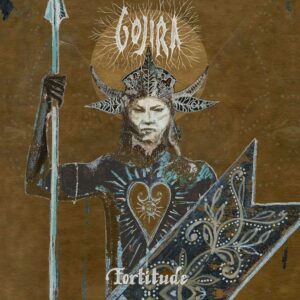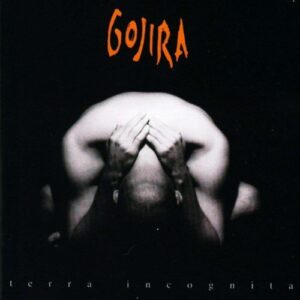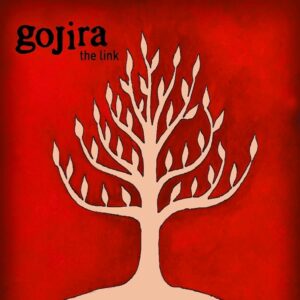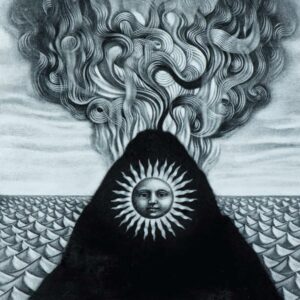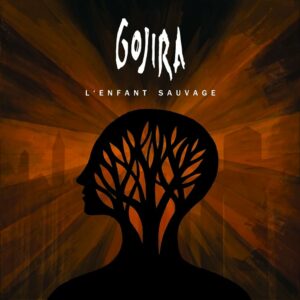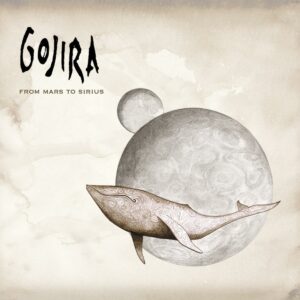Since becoming a household name practically overnight (to the average person, anyway) with their Olympics opening ceremony performance, which saw the band triple their monthly Spotify listeners, there has been a lot of renewed discussion around Gojira’s back catalogue. With a career spanning a quarter century and 7 albums, now’s as good a time as any to rank them. As with any discography ranking, this list is completely subjective, and we welcome you to comment your own down below. Now, without further adieu, let’s get to it.
#7 – Fortitude – (2021)
Let’s get one thing clear right out of the gate, Gojira don’t have any bad albums. Fortitude is still a solid record, especially for a band nearly 20 years into their careers. With infectiously catchy singles like “Another World” and “Into The Storm” doubling down on Magma‘s more streamlined, alternative metal style, the band continued the delicate balance of pummeling heaviness and mainstream accessibility that they so carefully walked on their previous album. Where Fortitude lets down, however, is in its failure to evolve Gojira’s sound. Outside of the neat Brazilian influences in Amazonian, which recall Roots-era Sepultura, and…whatever the hell “The Chant” is supposed to be, the band are mostly just going through the motions here. Even Joe Duplantier seems to be aware of this, as evidenced by the lyrics in “Grind”. All that said, Gojira playing it safe is still Gojira at the end of the day, and Fortitude rightly earned them their highest placement on the charts yet. I just hope that the next album is a bit more fresh.
#6 – Terra Incognita (2001)
Terra Incognita is a Latin term, which roughly translates to “unknown land”. That term, which Gojira’s 2001 debut derives its name, can best describe the band’s philosophy at the time. They took a kind of “everything and the kitchen sink” approach with Terra, fusing their death metal roots with elements of groove metal, prog, post-rock and ambient. The result was an album that, while clearly primarily derived from the spacey death metal of mid-period Morbid Angel, sounded like nothing else out there. Even otherwise straightforward cuts, like opening rager “Clone,” still throw curveballs with its atmospheric bridge and clean vocals. Elsewhere, “Satan Is A Lawyer” gives us a twisted take on contemporary nu-metal. “1990 Quantrillon De Tonnes” also sticks out as a particularly disturbing piece of post-rock, with its haunting shrieks and moans contrasting the track’s ethereal guitar work. Terra Incognita is a portrait of an ambitious young band, yet to find their sound. It’s a bit of a mess, but an utterly unique one.
#5 – The Link – (2003)
The Link saw Gojira honing their sound, taking the wild blending of genres present on their debut and trimming the fat. They also put a lot of focus into cohesion and concept, striving to write a record that flowed seamlessly. In the process, they crafted an album that’s simultaneously shorter, yet more sprawling and “epic” feeling. The title track and “Remembrance” both exemplify this focus, merging their death metal roots with that distinct sense of groove they’d come to be known for. Drummer Mario Duplantier also really comes into his own here. Moving away from the more traditional death metal drumming of “Terra”, he begins to incorporate tribal influences, machine gun double kick bursts and a generally more complex and progressive approach to his drumming. Don’t go thinking that he can’t still blast with the best of them though, just listen to his performance on “Wisdom Comes!” Though it suffers from fairly dry production and doesn’t quite reach the heights of the albums that came later, The Link is perhaps the most crucial album in Gojira’s evolution. It laid the groundwork for the classics that followed it, and its importance would be foolish to ignore.
#4 – Magma – (2016)
I’ll be completely honest, I didn’t like Magma when it came out. To my snobbish, teenage metalhead brain, Gojira had sold out big time. Gone for the most part were the death metal riffs, the blast beats, and the epic song lengths. In their place was a stronger focus on groove’s and catchy hooks, with Joe Duplantier’s clean vocals being more prominent than ever. What I failed to consider at the time, was that Gojira had been teasing this shift in sound for several albums now, going all the way back to “Indians” off of The Link. I also hadn’t appreciated the emotional weight of the lyrics, which largely dealt with the passing of the Duplantier brothers’ mother, and the superb sense of atmosphere across the whole of the album. While “Stranded” may be their “Enter Sandman,” deep cuts like “Low Land” and the title track showcased a sense of texture reminiscent of post-metal acts like ISIS. With additional barn burners like “Silvera” and “Pray”, Magma gave us a lot of variety that I didn’t fully grasp in 2016. I’ve learned to appreciate it a lot over the years though, and while I don’t think it quite measures up to the band’s classics, it’s a damn fine example of radio metal done right.
#3 – L’enfant Sauvage – (2012)
Now we’re crossing into classic territory. L’enfant Sauvage was, for many, the end of an era. The final hurrah for Gojira’s progressive death metal era. Regardless of whether you agree with that notion, they certainly crashed into the new decade with a bang on Sauvage. Featuring a slightly more straightforward and streamlined approach compared to the 2 albums that came before it, this record absolutely pummels from start to finish. “Liquid Fire,” “The Axe,” and “Planned Obsolescence” are all easily in the conversation for Gojira’s heaviest songs. While the title track and “The Gift of Guilt” foreshadowed some of more melody focused songwriting which they would later fully embrace on “Magma.” There’s really not much else to see about L’enfant Sauvage it might just be the most straightforward album Gojira have ever done, but that’s really what makes it so great. It’s their formula distilled and perfected.
#2 – The Way Of All Flesh – (2008)
It’s hard to condense an album like The Way of All Flesh into a single paragraph. It simultaneously represented a logical step forward from the canvas Gojira laid with Mars, and a massive evolution in their style. Hell, I could write a whole essay JUST analyzing “The Art of Dying”, it’s that notable. That’s how much depth there is here. At 75 minutes, Flesh is their longest album by far, yet for as intimidating as it is, I always find myself surprised at how fast it goes by. You can tell the band put a lot of thought into how this album would flow, often alternating hard hitting bangers like “Toxic Garbage Island” with spacey prog songs like “A Sight to Behold”. It’s a masterclass in pacing that I wish other metal bands would take cues from when writing hour+ long records. Oh, and that Randy Blythe feature on “Adoration For None” is iconic. With a beautifully heavy production job, a career-defining drum performance from Mario, and riffs upon legendary riffs, The Way Of All Flesh would easily be the singular career highlight of most other metal bands. It’s a testament to the strength of Gojira’s discography that it’s only their second best album.
#1 – From Mars To Sirius – (2005)
Let’s face it, you knew before even clicking on this list that this would be number 1. It just HAD to be, right? In a discography filled with classics, From Mars To Sirius is like an ascended classic. So many of Gojira’s most prominent traits started here, from the elaborate concept, environmentalist themes, those pick scrape breakdowns that every single 2010s metalcore band ripped off, the epic song lengths – Mars established them as titans of extreme metal. I mean, really, what other albums can have a song with a title like “The Heaviest Matter of The Universe” and have that song actually live up to its name? And I’d be remiss not to mention the production on this thing, it’s absolutely GIGANTIC sounding. “Flying Whales,” possibly the band’s most well-known song, shows off that sense of scale perfectly. It was the first Gojira song I ever heard, and I remember being absolutely taken aback by how a song could go from a tranquil opening, complete with the gentle sounds of whales in the distance, to almost comical levels of heaviness. It blew my mind back then, and I still find myself overwhelmed by Mars to this day. Even the softer moments on the album, like “World To Come” and “Global Warming”, have a real haunting intensity to them. Gojira have always been environmentalists, and despite this album featuring an abstract story about cosmic whales, they manage to communicate the very real threat posed by climate change in a way succinct enough to impact even the most ignorant listeners. From Mars To Sirius is one of those once-in-a-generation records that we will surely be talking about for decades to come. It’s not just Gojira’s best album, it’s one of the best progressive metal albums ever laid to tape.

